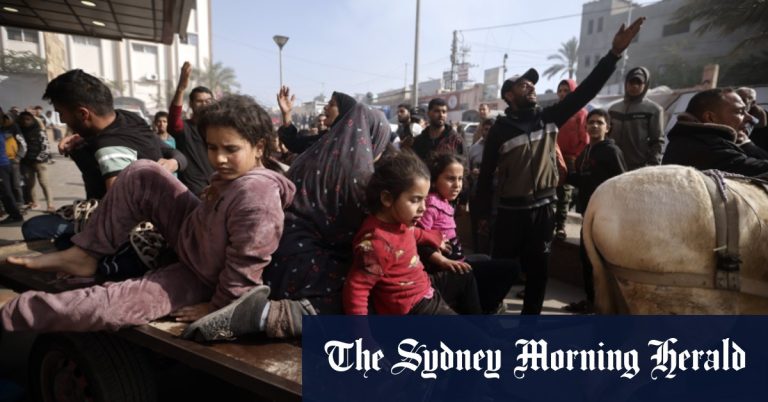Israel says that Hamas fighters operate in and around hospitals, which Hamas and the medical staff deny.
“Hamas is integrating its operations into and under hospitals and other medical facilities,” said Elad Goren of the Office for the Coordination of Government Activities in the Territories, the branch of the Israeli Defense Ministry that coordinates with the Palestinians. “A special effort led by a dedicated team has been made to ensure that civilians receive medical care.”
download
Residents said that the air, ground and sea bombardment was the most intense in the southern sector of Gaza since the war began in October.
A video clip filmed from afar showed scattered civilians wandering around a ghost town, crowded with tents and abandoned clothes fluttering on ropes, while sounds of gunfire rang out and smoke billowed into the sky.
Israel launched an offensive last week to seize the city of Khan Yunis, which it now says is the headquarters of Hamas militants responsible for the October 7 attacks on southern Israel that killed 1,200 people, according to Israeli statistics.
The latest phase of the war has brought the fighting deep into the last corners of the enclave, which is now crowded with people fleeing the bombing. Gaza health authorities said in an update on Monday that at least 25,295 Gazans had been killed since October 7.

Palestinians dig graves in Nasser Hospital in Khan Yunis to bury their relatives who were martyred in the Israeli bombing.credit: AP
The majority of Gaza's 2.3 million people are now confined to Rafah, south of Khan Yunis, and Deir al-Balah just north of it, crammed into public buildings and tent camps made of plastic sheeting mounted on wooden frames.
Lines of cars and donkey carts packed with belongings piled up and rushed south as Gazans tried to escape the bombardment.
He was buried in the hospital grounds
At Nasser Hospital, the only major hospital still accessible in Khan Yunis and the largest still operational in Gaza, video showed the trauma ward crowded with wounded being treated on the blood-stained floor.
Ahmed Abu Mustafa, an emergency physician, said he had not slept for 30 hours and was treating between 10 and 11 patients in the four-bed intensive care unit.
Outside, men dug graves inside the hospital grounds because it was not safe to go out to the cemetery. Authorities said 40 people were buried there.
In Brussels, Palestinian Authority Foreign Minister Riyad al-Maliki told reporters that the situation in Gaza was out of control and asked the European Union to call for a ceasefire.
“The health system has collapsed. There is no way to treat wounded Palestinians in the Gaza Strip, and they are unable to leave Gaza to receive treatment abroad.”
download
Israel says it will not stop fighting until it eliminates Hamas. But Palestinians and some Western military experts say that goal may be unachievable given the group's diffuse structure and its deep roots in Gaza, which it has ruled since 2007.
Although Israelis overwhelmingly support the war, a growing number led by relatives of the remaining hostages say the government must do more to reach an agreement to release them, even if it means reining in its offensive.
About 20 relatives of the hostages stormed a parliamentary committee session in Jerusalem on Monday, demanding that lawmakers do more to help release their loved ones.
Israeli Prime Minister Benjamin Netanyahu told a group of his relatives that there is no truth to reports about an agreement to release the hostages as part of a ceasefire.
Netanyahu’s office quoted him as telling them: “I say this very clearly because there are a lot of incorrect statements that definitely hurt you.”
Sami Al-Zuhri, head of Hamas' political unit in exile, told Reuters on Monday that Hamas is open to “all initiatives and proposals, but any agreement must be based on ending the aggression and complete withdrawal of the occupation” from Gaza.
New American-British strikes in Yemen
The Pentagon said US and British forces carried out a new round of strikes in Yemen, targeting an underground storage site belonging to the Houthis as well as missile and surveillance capabilities used by the Iran-allied group against shipping in the Red Sea.
The Houthis, who control the most populated areas in Yemen, said their attacks come in solidarity with the Palestinians at a time when Israel is bombing Gaza.

RAF weapons manufacturers are preparing an RAF FGR4 Typhoon to conduct air strikes against Houthi military targets in Yemen on Sunday.credit: British Ministry of Defence
The Houthi attacks disrupted global shipping and raised fears of global inflation. It also deepened fears that the repercussions of the war between Israel and Hamas would destabilize the Middle East.
So far, multiple rounds of strikes over the past month have failed to stop Houthi attacks against shipping.
In the latest response, the countries carried out eight strikes, with support from Australia, Bahrain, Canada and the Netherlands, according to a joint statement signed by the six countries.
“These precision strikes aim to disrupt and weaken the capabilities used by the Houthis to threaten global trade and the lives of innocent sailors,” the joint statement said.
British Defense Secretary Grant Shapps said in a statement that the strikes were carried out in self-defence.
“This action will deal a further blow to its limited stockpiles and its ability to threaten global trade,” Shapps said.
Reuters
Get a direct note from our foreign correspondents on what's making headlines around the world. Subscribe to the weekly What in the World newsletter here.

